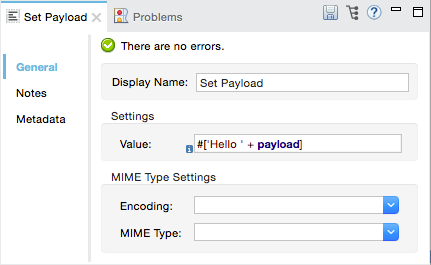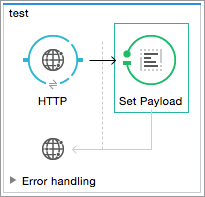Studio Visual Editor

| Field | Description |
|---|---|
Display Name |
Customize to display a unique name for the transformer in your application. Value: Set Payload |
Value |
Enter a literal string or a Mule expression that defines how Mule should set the payload. Value: String or Mule Expression |
XML "Editor or Standalone"
# Example setting a payload to a literal string. <set-payload value="MyNewPayload" doc:name="Set Payload"/> # Example setting a payload using a Mule expression. This takes the current payload and transforms it by adding the string "Hello " in front of it. Thus, if your payload was "Charlie", this set-payload transformer changes it to "Hello, Charlie". <set-payload value="#['Hello, ' + message.payload]" doc:name="Set Payload"/>text
| Element | Description |
|---|---|
set-payload |
Set a payload on your message (as shown in examples above). |
| Element Attribute | Description |
|---|---|
value |
The literal string or Mule expression that defines how Mule should set the payload. |
doc:name |
Customize to display a unique name for the transformer in your application. Note: Attribute not required in Mule Standalone configuration. |




